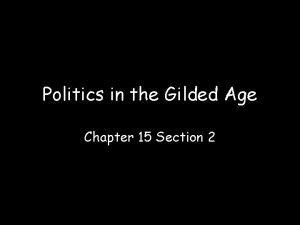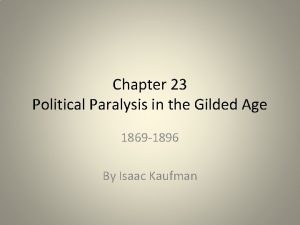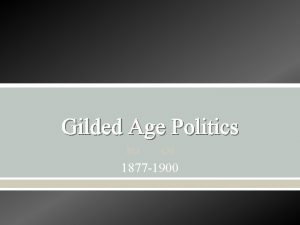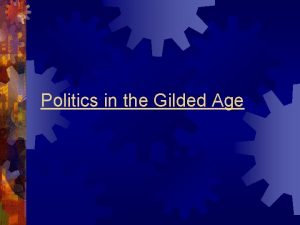Politics in the Gilded Age Gilded Age Term







- Slides: 7

Politics in the Gilded Age • Gilded Age- Term coined by Mark Twain to describe the Post. Reconstruction Era in America. • Suggested that a thin layer of prosperity covered the poverty and corruption of society. • Post-Reconstruction Era was marked by corruption in both business and politics. • The Business of Politics • Laissez-faire- meant a hands off approach to governments role in business. Businesses are unregulated. • People believe that if the Gov. stays out of the way the best and strongest businesses will survive.

• Most people supported Laissez-faire policies except when government involvement could benefit them. • An example of this would be the government making tariffs high. • Another way businesses liked Gov. . interference was when they offered grants and subsidies to large companies. • A subsidy is a payment made by the government to encourage the development of an industry. • The biggest example of a corporation being helped by subsidies was the Railroad Companies. • To ensure that help from the Government came, big business gave politicians gifts and money. • Spoils System-politicians appointed friends, relatives and supporters to government jobs, regardless of their qualifications

Political Parties of the Gilded Age • Republican • Republicans appealed to industrialists, bankers and eastern farmers; strong in the North and Midwest, and nearly nonexistent in the south. • Democrats • • Supported • • • “Tight Money” money backed by Gold High tariffs Generous pensions for soldiers Gov. aid to Railroads Limited immigration Blue Laws-regulations that prohibited certain private activities that some considered immoral. Democrats appealed to those who were less privileged, such as northern urban immigrants, laborers, southern planters and western farmers. • Supported • • • Increased money supply backed by silver Lower tariffs Higher farm prices Less Gov. . aid to big business Fewer Blue Laws.

Reforming the Spoils system • After the 1877 election President Hayes surprised many by actually appointing men that were qualified to do their jobs. • Hayes only served one term and he only ran for one term. • In 1880 the republicans are spilt into three groups: • The Stalwarts- favored the spoils system • The Half-Breeds-favored reform of the spoils system, loyal to party • The Independents-completely opposed to the spoils system • In 1881 James A Garfield (half-breed) was elected President and Chester A Arthur (stalwart) was his Vice President. • On July 2, 1881 the president is assassinated by Charles Giteau, because Garfield didn’t give him a job as expected. As he shot Garfield he was heard saying “I am a Stalwart and Arthur is now President. ”

Regulating Spoil System and the Railroads • • • Spoils System Pendelton Service Act- Created Civil Service Commission to classify government jobs. 1 People were tested for their jobs 2. Federal employees could not be fired for political reasons 3. Federal employees are not yet required to contribute to campaign funds • • Railroads Started in 1869 and by 1880 14 states had commissions that looked into railroad business practices. 1. Charging more for a short haul than a long haul on the same track 2. Offering Rebates(partial refunds) to favored customers 3. Keeping rates secret 4. Charging different rates to different people for the same service. The Interstate Commerce Act made it illegal for railroads to give special rates to powerful customers.

Railroads Impact on the Country • 1877 - Munn v. Illinois • This Supreme Court decision said that states were allowed to regulate certain businesses within their borders, including railroads, however since railroads crossed state lines they are run by the Federal Gov. This means that they pretty much went unregulated.

• • • Jacob S. Coxey Led a march of unemployed men on Washington to protest the fact that they were jobless and in need of work. Grover Cleveland Because of these high unemployment rates, and an economic depression Cleveland Wasn’t able to win his parties nomination the next election.













